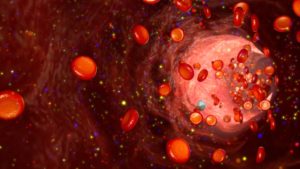
Aging occurs when the end of telomeres – the end of DNA strands – erode, which prevents proper cellular replication. This means new cells are created faulty, which results in degraded functioning of the tissue. Ultimately, this leads to cell death. Mitochondria cells then begin to not work effectively, resulting in less energy for cells to perform tasks. Lastly, the ability for cells to repair themselves diminishes, and all these factors contribute to aging.
Nitric oxide plays a vital role in all three of the aging factors and ultimately slowing down these processes contributes to healthier aging.
Nathan Bryan, who has extensively studied nitric oxide and its role and benefits, explained “It’s what we call the unified theory of aging. Nitric oxide controls telomerase, the enzyme that adds telomeres to the ends of the DNA. Nitric oxide controls mitochondria biogenesis. And nitric oxide is the cellular that tells stem cells to mobilize their damage.”
The root of aging is blood circulation. If blood cannot reach organs, cells, and tissues, then this results in poor health. Nitric oxide is essential for the flexibility of arteries along with playing a role in blood pressure, allowing for lower numbers, as blood can move more freely through the body with less pressure against the arteries.
All major conditions that occur with old age are a result of poor blood flow. For example, a heart attack occurs due to lack of blood to the heart. A stroke is a result of a lack of blood to the brain, etc.
Unfortunately, there is no way to measure nitric oxide in the body, so doctors can’t conclude whether low nitric oxide is a result of poor health. One potential sign may be hypertension, as high blood pressure may be a result of insufficient nitric oxide.
Additionally, there is no direct treatment to improve nitric oxide.
Nitrates found in food may help boost your nitric oxide levels, but this requires the proper conversion of nitrates to nitric oxide, which occurs in the mouth based on a person’s oral microbiome. Unfortunately, many people use mouthwashes that kill off both good and bad bacteria, which play a role in this conversion. This reduces the body’s ability to convert nitrates to nitric oxide. Regardless, it’s still important to consume foods high in nitrates like dark leafy greens, carrots, and beetroot. Don’t confuse nitrates with nitrites – nitrites are found in processed meats and are not good for you.
Being aware of the benefits of nitric oxide in the body can help you be more conscious of the foods you’re eating and the lifestyle habits you have to promote the production of nitric oxide rather than deplete it and age healthier.
Also read:
- 19 foods that increase blood flow
- Essential oils for aging skin: Preventing & treating wrinkles naturally